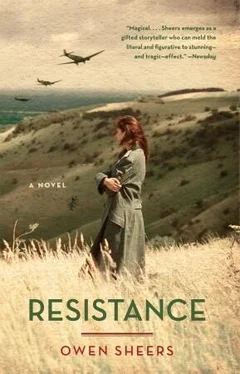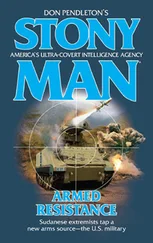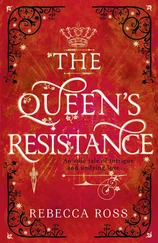Owen Sheers - Resistance
Здесь есть возможность читать онлайн «Owen Sheers - Resistance» весь текст электронной книги совершенно бесплатно (целиком полную версию без сокращений). В некоторых случаях можно слушать аудио, скачать через торрент в формате fb2 и присутствует краткое содержание. Год выпуска: 2009, Издательство: Anchor, Жанр: Современная проза, на английском языке. Описание произведения, (предисловие) а так же отзывы посетителей доступны на портале библиотеки ЛибКат.
- Название:Resistance
- Автор:
- Издательство:Anchor
- Жанр:
- Год:2009
- ISBN:нет данных
- Рейтинг книги:3 / 5. Голосов: 1
-
Избранное:Добавить в избранное
- Отзывы:
-
Ваша оценка:
- 60
- 1
- 2
- 3
- 4
- 5
Resistance: краткое содержание, описание и аннотация
Предлагаем к чтению аннотацию, описание, краткое содержание или предисловие (зависит от того, что написал сам автор книги «Resistance»). Если вы не нашли необходимую информацию о книге — напишите в комментариях, мы постараемся отыскать её.
Resistance — читать онлайн бесплатно полную книгу (весь текст) целиком
Ниже представлен текст книги, разбитый по страницам. Система сохранения места последней прочитанной страницы, позволяет с удобством читать онлайн бесплатно книгу «Resistance», без необходимости каждый раз заново искать на чём Вы остановились. Поставьте закладку, и сможете в любой момент перейти на страницу, на которой закончили чтение.
Интервал:
Закладка:
A rumpled man perched on a rock in front of an easel, shrunken within a heavy greatcoat lashed at his waist with a thick leather belt. This was how she’d first seen him. She was nine years old and her mother had trusted her with delivering the butter and milk herself. The people at the old monastery had been making their own milk and butter, but now they’d stopped.
“Thought that wouldn’ last long,” her mother had said to her father when he’d come in and told her. “They’re only playing at farmin’ up there.”
She was speaking from the kitchen, and Sarah’s father, safely out of sight in the living room, rolled his eyes in response, making Sarah giggle in the chair where she sat playing with the kitten. Ever since her brothers had left, he’d been more like this. Gentler where once he’d been hard. More fun where once he’d been serious. It was as if the wound opened by his sons’ leaving had shown him where he’d been wrong inside, and now he was trying to fix himself, however late he’d left it.
“I’m not goin’ up there twice a week, mind!” Her mother’s voice had risen above the sound of her clattering at the sink. “However much you pays me!”
“Well, you won’ ’ave to,” her father had answered, winking at Sarah. “The littl’un cun take it up to ’em. Can’t you, bach?”
This was before the stories of what went on in the monastery filtered out into the valley, after which her parents forbade her ever to go near the place again. But in those early weeks of summer, before those stories had leaked beyond the monastery’s thick walls, Sarah relished this twice-a-week chore. She felt as if she’d crossed an invisible boundary and passed over into a new, adult world. The sombre sense of responsibility, the excursions beyond her familiar orbit, the robust, imposing building of the old monastery growing before her as she walked up the hill.
Usually one of the daughters would take the milk and butter at the front door. Once a week, on every second trip, they’d give her some coins in return, which she carefully tipped into her coat pocket. She never saw any of the men. Just once or twice she heard a man’s voice from within or from above; snatches of conversation through an open window between the sawing and hammering of carpentry or the lighter taps of a chisel against wood. So it came as a surprise to her, when, one day after three weeks of this routine, she’d crested the hill on the way home and seen the poet perched on his rock in front of his easel. He was facing away from her looking up at Y Twmpa, the steep flanked hill rising at the end of the valley. Sarah crept closer, trying to see what he was painting, but all she could make out was a wash of faint colours, vaguely echoing the shape of the landscape in front of him. Suddenly he turned round. He looked straight at her with no hint of surprise, his tufted blond brown hair lifted off his forehead in the light wind. He was small. A boyish face. Dark eyes with heavy lids behind a pair of round-framed spectacles. Then he’d turned away again and returned to his easel in the way the wild ponies on the hill would fix her for a moment, then drop their heads to graze again. But the turn away had also seemed like an offer; to come closer, to watch him work. Which is what Sarah did.
She sat just behind his right shoulder, her knees to her chin and her arms round her knees, locked in place with a hand gripped at each wrist. He was silent. She couldn’t even hear him breathe. There was just the brush across the paper; an irregular, slow breathing of weak colour. Sarah watched the painting evolve. It was a watercolour and if she leant forward she could just see the faint pencil lines already marking out the landscape in front of them both. As he filled these spaces with colour, with washes of his brush, she saw that the painting wasn’t, after all, this landscape before them. And yet it also was. It was as if the scene had been put through a fairground mirror; distorted, crooked, its features enlarged, the curves of the trees made fluid. The poet continued, sometimes pausing for long minutes, doing nothing but looking. Sarah did the same, following his eyes up to the hill, then dropping them to the easel again as he filled a patch of sky pink, then grey, then blue.
He never spoke. After weeks of hearing the men’s voices she’d finally met one of them, only for him to be silent. Even without his voice, though, she could tell he was different from any man she’d met before; from her father, her older brothers, or her uncle. His eye was quick within a still body. When he lifted his hand to paint, his arm moved as though through water. He smelt different too. Not of animals and earth but of sawdust and paint. Of books and a long, quiet pain. In that way, she thought now, lying in her dark bedroom so many years later, he’d been like an animal. A wounded animal that couldn’t speak of its sickness, of how or where it hurt, but could still, somehow, wear the knowledge of that pain. Unspoken, unheard, but so definitely there.
He’d said nothing to her that first time and eventually, after a few minutes, thinking of her mother’s scolding, Sarah had got up and carried on walking down the hill, the loose coins chinking in her coat pocket with every step down the slope. The next week she walked home the same way and he was there again, so again Sarah sat down and watched him work. This time, made brave by the repetition of the situation, she’d spoken to him.
“S’cuse me, sir,” she’d said. “Wha’ yer doin’?”
He paused in his looking. “Writing a poem,” he said, splaying his brush into a pale green tablet and lifting it to the easel. “I’ve started writing a poem.” He turned to look at her. His face was serious with just the hint of a smile at the corner of his mouth. “I think it’s going to be a long poem, although, right now, it’s rather short.” He went back to the painting. “And actually it might not be a poem at all.” Sarah laughed nervously. She didn’t understand him. He wasn’t writing a poem. He was painting. His voice too had caught her off guard. It was high, slightly tremulous, the vowels flattened under the weight of London. She tucked her chin back behind her knees and decided not to say anything else.
“Do you speak Welsh?” he asked her, not looking away from his painting.
“No, sir. Me mam does. A bit.”
“Oh,” he said. “That’s good.”
He went back to his long looking. A pair of flies were buzzing around his head, but he seemed not to notice them. Sarah began to get bored. She thought of leaving, but there was nothing but chores for her back at the farm. She thought of her brothers. How now they’d left there were more chores than ever for her to do. How her father was always tired. “It’s too much, cariad,” she’d heard her mother telling him when he came in late and slumped in the chair by the fire. “Too much for jus’ you now.”
“Would you like to hear a story?” The poet’s strange voice brought her back sharply.
“Wha’ kinda story?” Sarah said. Her brothers had told her a ghost story once, about Hanging Judge Jeffreys down at Pandy. They’d been drinking at the Skirrid Inn. The landlord had shown them the rope marks in the beams where Jeffreys had strung up the Monmouth rebels. When they got back, beer on their breath, they’d sat on her bed and told her how the ghosts of those unfortunate rebels still roamed the inn, their necks hideously elongated, broken, and bruised. She hadn’t been able to sleep for a week.
“A story about that hill,” he said, pointing his brush at Y Twmpa. “About all these hills.” He swept the brush wider as if the real hills were his canvas now. He turned to look at her again. “A story about your ancestors.”
And that was when the poet began to tell Sarah his stories, recasting the land and hills she’d known all her life as the backdrop for his Celtic myths, for tales of saints and soldiers, of kings and bards. His stories worked upon the valleys around them like his paintings. He spoke of places she knew or that she’d heard of before, St. Peter’s Well, The Abbey, The Cat’s Back, St. David’s Cell, but the lens of his stories made them all new again. Some of the stories she’d even heard before, but never like this, never growing from the very hills of her birthplace. Stories of King Arthur, Lancelot, and Percival. About Welsh princes, Irish princesses, and English armies. The stories were not always about the Black Mountains, though. Sometimes he’d tell her stories from his own life too, about growing up in London, or about his time in France during the war. But while his stories of the hills were often full of war, of Llewellyn ap Gruffydd, Owain Glyn Dŵr, and the barbarous armies of Edward I, his French stories were not war stories. They were stories about the villages he’d lived in, about the French dogs and the French children. About the flowers and birds of the French countryside and, just once, a story about Christmas in the trenches. About how up and down the line one Christmas Eve the soldiers had hung wreaths on their 303s and climbed out into no-man’s-land to play football and share cigarettes. How for a day, the sky was quiet again. It was after that story, Sarah asked him if he’d ever been shot. She’d heard her father talk with a strange admiration about men he knew who’d been shot. He’d farmed throughout the war and seemed almost envious of their scars. The poet didn’t say anything in reply but just drew up his loose-fitting trousers to expose a bullet wound puckered above his left knee. His legs were thin and white, the veins ice blue and shallow beneath the skin. The wound was in the shape of a melted star. After a few seconds he lowered his trouser leg and went back to his painting and Sarah felt sorry for asking.
Читать дальшеИнтервал:
Закладка:
Похожие книги на «Resistance»
Представляем Вашему вниманию похожие книги на «Resistance» списком для выбора. Мы отобрали схожую по названию и смыслу литературу в надежде предоставить читателям больше вариантов отыскать новые, интересные, ещё непрочитанные произведения.
Обсуждение, отзывы о книге «Resistance» и просто собственные мнения читателей. Оставьте ваши комментарии, напишите, что Вы думаете о произведении, его смысле или главных героях. Укажите что конкретно понравилось, а что нет, и почему Вы так считаете.












